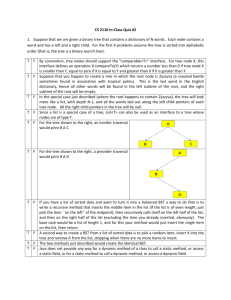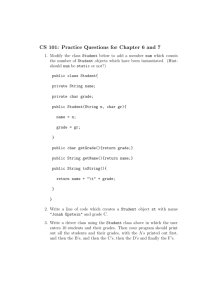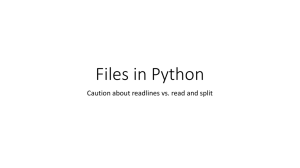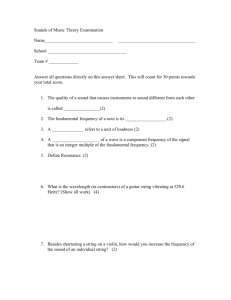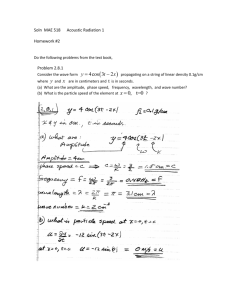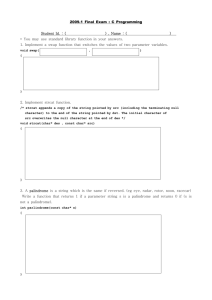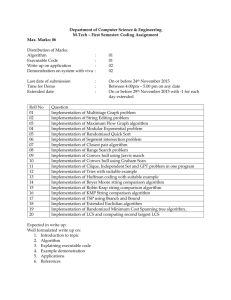java-to-cpp
advertisement
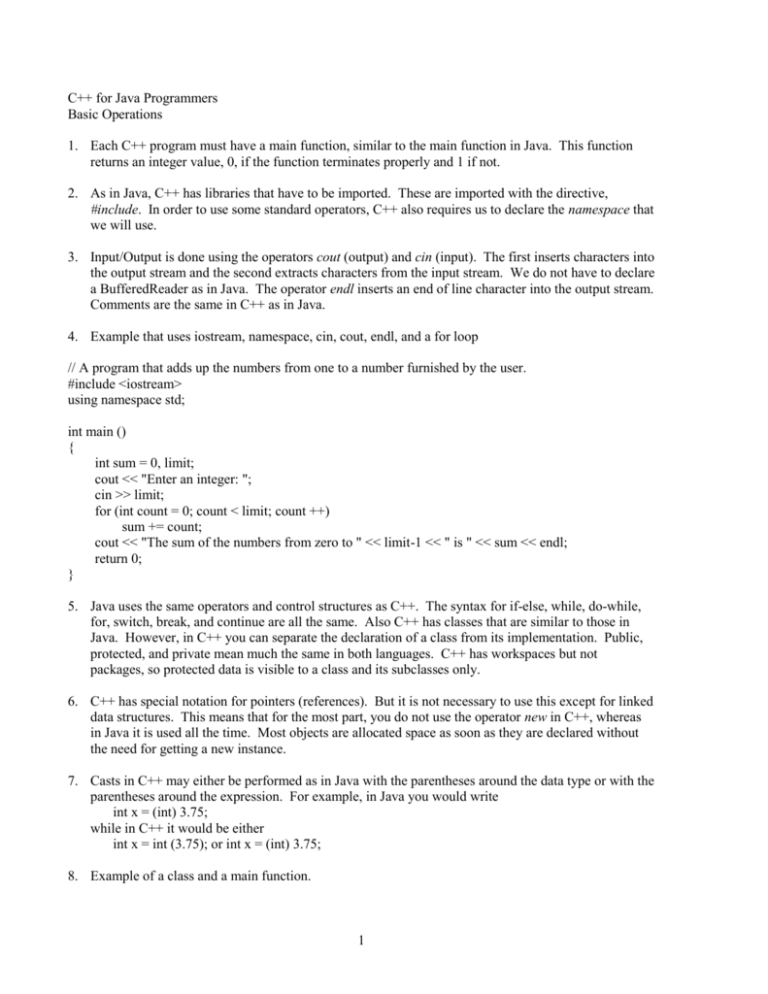
C++ for Java Programmers
Basic Operations
1. Each C++ program must have a main function, similar to the main function in Java. This function
returns an integer value, 0, if the function terminates properly and 1 if not.
2. As in Java, C++ has libraries that have to be imported. These are imported with the directive,
#include. In order to use some standard operators, C++ also requires us to declare the namespace that
we will use.
3. Input/Output is done using the operators cout (output) and cin (input). The first inserts characters into
the output stream and the second extracts characters from the input stream. We do not have to declare
a BufferedReader as in Java. The operator endl inserts an end of line character into the output stream.
Comments are the same in C++ as in Java.
4. Example that uses iostream, namespace, cin, cout, endl, and a for loop
// A program that adds up the numbers from one to a number furnished by the user.
#include <iostream>
using namespace std;
int main ()
{
int sum = 0, limit;
cout << "Enter an integer: ";
cin >> limit;
for (int count = 0; count < limit; count ++)
sum += count;
cout << "The sum of the numbers from zero to " << limit-1 << " is " << sum << endl;
return 0;
}
5. Java uses the same operators and control structures as C++. The syntax for if-else, while, do-while,
for, switch, break, and continue are all the same. Also C++ has classes that are similar to those in
Java. However, in C++ you can separate the declaration of a class from its implementation. Public,
protected, and private mean much the same in both languages. C++ has workspaces but not
packages, so protected data is visible to a class and its subclasses only.
6. C++ has special notation for pointers (references). But it is not necessary to use this except for linked
data structures. This means that for the most part, you do not use the operator new in C++, whereas
in Java it is used all the time. Most objects are allocated space as soon as they are declared without
the need for getting a new instance.
7. Casts in C++ may either be performed as in Java with the parentheses around the data type or with the
parentheses around the expression. For example, in Java you would write
int x = (int) 3.75;
while in C++ it would be either
int x = int (3.75); or int x = (int) 3.75;
8. Example of a class and a main function.
1
In C++ if everything is stored in the same file, the class definition must come before the main
function where it is instantiated and used. Note that we do not have to get a new instance of the class,
person, as we would have in Java. Also we must include the string library in order to use string input,
output, assignment, and comparison. As in Java, we can only access public members of the class in
the main function and not data items declared to be private. Data are usually declared as private in
C++, much the same as in Java.
#include <iostream>
#include <string>
using namespace std;
class person
{
public:
person (string n, int a)
{
name = n;
age = a;
} // constructor
void displayAge ()
{
cout << name << "'s age is " << age << endl;
} // function displayAge
private:
string name;
int age;
};
int main ()
{
person girl ("Alice", 7);
girl.displayAge ();
return 0;
}
9. In C++, the declaration of a class is often separated from its implementation. The declaration is
called an interface and is stored in a file with extension .h. The implementation, or source file, is
stored in a file with an extension .cpp. The previous example would be stored in three files, person.h,
person.cpp and personMain.cpp. They are shown below.
person.h
#include <string>
using namespace std;
class person
{
public:
person (string, int);
2
void displayAge ();
private:
string name;
int age;
};
person.cpp
#include <iostream>
#include "person.h"
using namespace std;
person :: person (string n, int a)
{
name = n;
age = a;
} // constructor
void person :: displayAge ()
{
cout << name << "'s age is " << age << endl;
} // function displayAge
personMain.cpp
#include "person.h"
using namespace std;
int main ()
{
person girl ("Alice", 7);
girl.displayAge ();
return 0;
} // main function
10. Separating a program into all these files is clearly unnecessary in such a simple case. However, it is
very useful in a large program in order to divide it into pieces that can be easily managed. A C++
program, like a Java program, can be stored in one single file, but it can be hard to find your way
around a very large program that is not divided into separate sections. It is possible to store several
class interfaces in the same .h file and several source files in one .cpp file.
11. C++ doesn’t allow library files to be included more than once. For that reason, if we have the same
#include directive in two files, one of which is also included in the other, there will be an error.
Therefore C++ provides a means to tell the compiler to use only one copy of any include file. This is
done by surrounding the code by the directives
#ifndef FILE_H
#define FILE_H
…
#endif
3
The name FILE_H can be any identifier that is not used in the file. It is usually the name of the class
in capital letters followed by an underscore, and then either H for a .h file or C for a .cpp file.
12. Java has explicit exception handling, but C++ does not. Programmers are themselves responsible for
catching array indices out of bounds or data reading errors. However, C++ does provide some help.
One example is the good function in iostream. It indicates whether or not the piece of data just read is
good, that is that it represents an integer or a double. It is a function in the cin class, and is used by
calling cin.good (). It returns 1 for good data and 0 for bad data.
4
Pointers in C and C++
1. C uses pointers in many places, but this is not necessary in C++. In C++, pointers are only needed for
linked data structures. But it is useful to know something about how they are handled in C as well as
in C++. A pointer is a reference to (address of) some object. The object may be any data item, but
we will mainly use a pointer as a reference to a class.
2. Declaring pointers using the asterisk
int * p; int * q; or int * p, * q;
This provides storage for the pointer, but not for the integer pointed to.
p:
q:
3. Pointers may be assigned values. The value NULL denotes a pointer that doesn’t reference anything.
It is often used to terminate lists. Note that it is capitalized, unlike null in Java. You can use 0 for
this purpose as well.
4. Providing storage for dynamic variables
This can be done in two ways:
int x; p = & x;
p:
x:
p = new int;
p:
Note that in the second case, the integer location does not have a name. It is anonymous. It can only
be accessed through the pointer p. This is done by dereferencing it using the * operator. Thus *p is
the name of the location pointed to by p. The ampersand in &x denotes the address of x. It is the
value assigned to p in the first example.
p:
*p
5. In both cases, the pointer is given a value, the address of the object to which it points, but the object
itself does not have a value. It can be given a value either by
x = 6; or *p = 6;
This puts the integer 6 into the location that p points to. That is, p holds the address of the integer
object with value 6.
p:
*p
6
6. Java has a garbage collector that runs periodically and finds all locations that are no longer referenced
anywhere in the program. C++ relies on the programmer to clean up space when it is not needed any
more. The following code indicates that the space is no longer needed by the program and can be
reused by the program sometime in the future.
delete p;
p = NULL;
5
It is wise to assign NULL to p so that returned space will not be inadvertently referenced elsewhere in
the program.
7. C++ also allows you to go the other way, from the object to a pointer. This uses the & operator. It
gives the address of an object. For example, p = & x; says that p has been assigned the address of the
integer x. The ampersand appears mainly in parameter lists. It indicates that the parameter is the
address of an object rather than the value of the object.
8. In C++ we mainly use pointers to create linked data structures. There is a special notation for this,
the arrow, ->. It is the combination of a hyphen and greater than sign. The arrow is used for
dereferencing pointers in linked structures. If we have a class with some data and a next field, the
arrow can be used to access the fields.
9. The following is an example of a linked structure. It shows some of the needed functions, but not all
of them. However, from this you can see how the arrow is used to dereference pointers.
#include <iostream>
#include <string>
using namespace std;
class ListNode
{
public:
ListNode (string, string);
void displayNode ();
ListNode * getNext () const;
void setNext (ListNode *);
private:
string id;
string name;
ListNode * next;
};
class ListClass
{
public:
ListClass ();
void displayList ();
private:
ListNode * listHead, * listRear;
void addToRear (string, string);
};
ListNode :: ListNode (string i, string n)
{
id = i;
name = n;
next = NULL;
} // constructor
ListNode * ListNode :: getNext () const { return next; } // getNext
6
void ListNode :: setNext (ListNode * nextNode) { next = nextNode; } // setNext
void ListNode :: displayNode ()
{
cout << "Id: " << id << " Name: " << name << endl;
} // displayNode
ListClass :: ListClass ()
{
listHead = NULL;
listRear = NULL;
} // constructor
void ListClass :: addToRear (string id, string name)
{
ListNode * newNode = new ListNode (id, name);
if (listHead == NULL) // Empty list.
{
listHead = newNode;
listRear = newNode;
}
else // List contains at least one node.
{
listRear->setNext (newNode);
listRear = newNode;
}
} // addToRear
void ListClass :: displayList ()
{
ListNode * tempNode = listHead;
while (tempNode != NULL)
{
tempNode -> displayNode ();
tempNode = tempNode->getNext ();
}
} // displayList
10. Although you do not have to use pointers very often in your programs, you may find them cropping
up in error and warning messages. In particular, strings are implemented as arrays of characters with
a special character attached to the end. Thus the string, “Alice”, is stored in a 6 character array with a
pointer to the first character and the null character, ‘\0’, in the last place. So instead of declaring a
name as a string, it can be declared as a character array.
char * name; or even char name [6];
Some keyboard input and output works better with old style strings. If these are used in a program,
use #include <cstring> instead of <string>. If you do this, you cannot use <, ==, or > to compare
strings or = for string assignment. Instead, use strcpy (string copy) to assign (copy) one string to
7
another and strcmp (string compare) to compare strings. So instead of name = “Alice”; you would
use
strcpy (name, “Alice”);
and instead of if (name < “Alice”)
use
if (strcmp (name, “Alice”) < 0)
This latter function works the same as compareTo in Java. That is, if the first string is less than the
second string, strcmp returns a negative value. If the strings are equal, it returns 0, and if the first is
larger than the second, it returns a positive value.
11. If your program has large linked lists, you might need to include a copy constructor and a destructor.
A copy constructor is needed when the list is either to be copied as a value parameter or returned as
the value of a function. It creates an object of the same type as the class. A destructor is executed
when the function terminates that created the list. The copy constructors are not called by the
functions in the program. They are automatically used when required. The following are examples
of both that can be added to the simple list above. Two declarations would also have to be added to
the .h file,
ListClass (const ListClass & );
~ListClass ();
// copy constructor
// destructor
ListClass :: ListClass (const ListClass & list)
// copy constructor
{
ListNode * tempNode = list.listHead;
ListNode * copyNode, * previous = NULL;
while (tempNode != NULL)
{
copyNode = new ListNode ("", "");
* copyNode = * tempNode;
if (previous == NULL)
listHead = copyNode;
else
previous->setNext (copyNode);
previous = copyNode;
tempNode = tempNode->getNext ();
}
listRear = previous;
} // copy constructor
ListClass :: ~ListClass ()
// destructor
{
ListNode * tempNode = listHead;
while (tempNode != NULL)
{
listHead = tempNode;
tempNode = tempNode->getNext ();
delete (listHead);
}
listHead = NULL;
listRear = NULL;
} // destructor
8
Parameters in C++ and Java
1. C++ and Java have similar forms of parameter lists. In the lists, a data type is followed by the
parameter’s name. They both make a distinction between the parameters in the function call and in
the statement of the function.
2. The following example illustrates the use of parameters in a simple C++ program.
#include <iostream>
using namespace std;
void example (int x, int & y)
{
x = 3;
y = 4;
} // function example
int main ()
{
int a = 1;
int b = 2;
example (a, b);
// function call
cout << "a is " << a << endl;
cout << "b is " << b << endl;
return 0;
} // main function
3. First for some terminology. The variables in the function, x and y, are called formal parameters.
They are in some sense place-holders for the actual parameters, a and b, in the function call. The
function call is the statement of the function in main. Actual and formal parameters must agree in
number, order and type. That is true for both C++ and Java. This means that there must be the same
number of actual parameters as formal, the order in which they appear in the formal list must be used
in the actual list, and the types must correspond one-to-one.
4. Parameters also are separated into two other kinds, pass by value and pass by reference. If a
parameter is passed by value, the value of the actual parameter is copied into the location for the
formal parameter. In the above example, the value of a, which is 1, is copied into the corresponding
formal parameter, x. When parameters are passed by reference, however, the address of (reference
to) the actual parameter is copied into the formal parameter.
5. C++ makes a visible distinction between value and reference parameters. If a parameter is to be
passed by reference, an ampersand is placed before it in the formal parameter list. Thus in the
example, int & y indicates that y is a reference parameter. Note that the ampersand is used to indicate
the address of the variable. In the function, when a reference parameter is to be accessed, the address
is used to find the actual parameter. Then any changes to the parameter in the function will really be
made to the actual parameter in main. So the output for the above program will be
a is 1
b is 4
6. In Java, simple data types, int, double, boolean, and char, are always passed by value. In C++ you
may choose to pass them by either value or reference. Java does not allow this. However, in Java, all
9
classes are passed by reference. Again you cannot pass them by value. The language doesn’t give
the programmer a choice.
7. While C++ allows programmers to decide whether to put an & into the parameter list, or not, it
mandates that some objects be passed by reference. All arrays are passed by reference by default.
And here the & is not used, since it is understood. However, files must be passed by reference, and
you must include the & in the parameter list. This is also true for some other data structures, so if you
get a strange error message concerning a parameter list, it may be because an & is missing.
8. Some efficiency considerations are involved here. When a parameter is passed by value, a copy of
the parameter is made for the formal parameter. If the data structure is large, this can be very time
consuming. Java avoids this problem by simply not permitting it. And C++ often does the same, but
it is not always easy to know when. If you want to make sure that the actual parameter will not be
changed by the function, even if it must be passed by reference, you can make it a const parameter.
For example in the following function, anArray is a constant array parameter. It can be used by the
function but not changed by it.
int arrayExample (const int [] anArray)
10
Files in C++
1. Files in C++ are handled in a manner similar to that in Java. Their declaration is simpler, however.
You must use #include <fstream> in order to work with files. Then to declare a file called inFile, use
the following:
ifstream inFile;
for an input file or
ofstream outFile;
for an output file.
2. Files are opened using the open statement. This connects the file name used in the program with the
name of the file on the disk. So once the file has been declared, it’s opened by:
inFile.open ("inFile.txt"); or
outFile.open ("outFile.txt");
3. In Java, file opening statements are put into a try-catch block. In C++, we check for failure by:
if (inFile.fail ()) cerr << "Failure to open the file. " << endl;
We can then supply our own code to handle the error. The class, cerr, is used to handle errors. It
defaults to the output screen, cout.
4. Reading from a file is done the same way as in Java. Thus inFile >> name; will read a string into the
variable, name. We would write this in Java as name = inFile.readLine (); Writing to a file is also
easy. To output the string called name to the file outFile, just write outFile << name << endl; In Java
this would be outFile.println (name);
5. Files are closed by inFile.close () or outFile.close (). This is more valuable for output files than input
files, since it may be necessary to flush the output buffer out to the file. This might not be done
automatically.
6. In C++ you can read a string of data from either the keyboard or a file in one statement, so long as the
data items are separated by white space. For this purpose, white space consists of either spaces, the
tab character, or the end of line character (denoted by ‘\n’ in C and C++). For example, if number is
an integer and name is a string, you can write
cin >> number >> string; or
inFile >> number >> string;
This is more useful for files than for the keyboard, because at the keyboard it is better to prompt for
each data item.
7. If you are reading an integer or double with cin or inFile, you have to be careful to also read the end
of line character. Otherwise if may be difficult to read the following line completely. This may have
to be done separately. The following code is often used for just this purpose:
char ch;
cin.get (ch); or inFile.get (ch);
Note that you can read an entire line of text into a string with getline. The code for this is
getline (cin, name); or getline (inFile, name);
8. The following is an example that reads from a file and stores the data into an array of classes.
#include <fstream>
#include <iostream>
#include <string>
11
using namespace std;
class ListNode
{
public:
ListNode (); // constructor
void readNode (ifstream &, int);
void displayNode ();
private:
int id;
string name;
};
ListNode :: ListNode () {id = 0;} // constructor
void ListNode :: readNode (ifstream & inFile, int newId)
{
char ch;
inFile.get (ch);
id = newId;
getline (inFile, name);
} // readNode
void ListNode :: displayNode ()
{
cout << "Id: " << id << endl;
cout << " Name: " << name << endl;
} // displayNode
const int maxSize = 20; // Global constant
class ListClass
{
public:
ListClass ();
ListClass (const ListClass &); // copy constructor
bool readList (ifstream &);
void displayList ();
protected:
ListNode list [maxSize];
int listSize;
};
ListClass :: ListClass () { listSize = 0;} // constructor
ListClass :: ListClass (const ListClass & listClass)
{
listSize = listClass.listSize;
for (int count = 0; count < listSize; count ++)
list [count] = listClass.list [count];
} // copy constructor
12
bool ListClass :: readList (ifstream & inFile)
{
int id;
if (inFile.fail ())
{
cout << “Failure to open file.” << endl;
return false;
}
while ((inFile >> id) && (listSize < maxSize))
{
list [listSize].readNode (inFile, id);
listSize ++;
}
inFile.close ();
return true;
} // readList
void ListClass :: displayList ()
{
for (int count = 0; count < listSize; count ++)
list [count].displayNode ();
} // displayList
int main ()
{
ifstream inFile;
ListClass myList;
bool success;
inFile.open (“inFile.txt”);
success = myList.readList (inFile);
if (success) myList.displayList ();
else cout << "Failure to open file." << endl;
return 0;
} // main
13
Inheritance and Polymorphism
1. Inheritance in C++ works very much the same way as in Java. The main difference is the notation.
Instead of the keyword extends, C++ uses a colon followed by the keyword public and then the name
of the base class.
Example: class CustomerNode : public ListNode
This indicates that CustomerNode is a subclass of ListNode and inherits all the public and protected
data and methods in ListNode.
2. When a method in a subclass accesses a method in the super class, Java uses the keyword super. The
same thing is done in C++ by following the name of the base class by a double colon and then the
name of the method.
Example: ListNode :: displayNode ();
This indicates that the method called displayNode in the base class should be called rather than the
version in the subclass. The double colon , ::, means class membership.
3. Abstract methods in Java are called virtual functions in C++. They have the same purpose in both,
that is to standardize function names in the subclasses. So when this function is called with an object,
the object will act appropriately.
Example: virtual bool readList (ifstream &) = 0;
Here a function in ListClass is declared to be virtual, since it will not be implemented in ListClass but
only in the subclasses.
4. The following example defines a ListNode that is inherited by CustomerNode and ProductNode.
ListNode
CustomerNode
ProductNode
5. And a ListClass that is inherited by a CustomerList and a ProductList.
ListClass
CustomerList
ProductList
14
#include <fstream>
#include <iostream>
#include <iomanip>
#include <string>
using namespace std;
class ListNode
{
public:
ListNode ();
void readNode (ifstream &, string);
void displayNode ();
ListNode * getNext () const;
void setNext (ListNode *);
protected:
string id;
string name;
ListNode * next;
};
class CustomerNode : public ListNode
{
public:
CustomerNode ();
void readNode (ifstream &, string);
void displayNode ();
private:
string phone;
};
class ProductNode : public ListNode
{
public:
ProductNode ();
void readNode (ifstream &, string);
void displayNode ();
private:
float price;
};
class ListClass
{
public:
ListClass ();
virtual bool readList (ifstream &) = 0;
void displayList ();
protected:
ListNode * listHead, * listRear;
void addToRear (ListNode *);
};
15
class CustomerList : public ListClass
{
public:
CustomerList (ifstream &);
bool readList (ifstream &);
void displayList ();
};
class ProductList : public ListClass
{
public:
ProductList (ifstream &);
bool readList (ifstream &);
void displayList ();
};
ListNode :: ListNode () { next = NULL;} // constructor
void ListNode :: displayNode ()
{
cout << "Id: " << id << " Name: " << name << endl;
} // displayNode
void ListNode :: readNode (ifstream & infile, string newId)
{
id = newId;
getline (infile, name);
} // readNode
ListNode * ListNode :: getNext () { return next; }
void ListNode :: setNext (ListNode * nextNode) {
next = nextNode; }
CustomerNode :: CustomerNode ()
{
ListNode :: ListNode ();
phone = “”;
} // constructor
void CustomerNode :: readNode (ifstream & customerFile, string newId)
{
ListNode :: readNode (CustomerFile, newId);
getline (customerFile, phone);
} // readNode
void CustomerNode :: displayNode ()
{
ListNode :: displayNode ();
cout << "Phone: " << phone << endl;
} // displayNode
16
ProductNode :: ProductNode ()
{
ListNode :: ListNode ();
price = 0;
} // constructor
void ProductNode :: readNode (ifstream & productFile, string newId)
{
ListNode :: readNode (productFile, newId);
productFile >> price;
char ch;
productFile.get (ch);
} // readNode
void ProductNode :: displayNode ()
{
ListNode :: displayNode ();
setprecision (2);
cout << "Price: " << price << endl;
} // displayNode
ListClass :: ListClass ()
{
listHead = NULL;
listRear = NULL;
} // constructor
void ListClass :: addToRear (ListNode * newNode)
{
if (listHead == NULL)
{
listHead = newNode;
listRear = newNode;
}
else
{
listRear->setNext (newNode);
listRear = newNode;
}
} // addToRear
void ListClass :: displayList ()
{
ListNode * tempNode = listHead;
while (tempNode != NULL)
{
tempNode -> displayNode ();
tempNode = tempNode->getNext ();
}
} // displayList
17
CustomerList :: CustomerList (ifstream & customerFile)
{
customerFile.open ("custfile.txt");
if (customerFile.fail ())
cerr << "Failure to open customer file." << endl;
else
cout << "Customer file opened" << endl;
} // constructor
bool CustomerList :: readList (ifstream & customerFile)
{
string id;
getline (customerFile, id);
while (!customerFile.eof ())
{
CustomerNode * newNode = new CustomerNode ();
newNode->readNode (customerFile, id);
addToRear (newNode);
getline (customerFile, id);
}
customerFile.close ();
return true;
} // readList
void CustomerList :: displayList ()
{
CustomerNode * tempNode = (CustomerNode *) listHead;
while (tempNode != NULL)
{
tempNode -> displayNode ();
tempNode = (CustomerNode *) tempNode->getNext ();
}
} // displayList
ProductList :: ProductList (ifstream & productFile)
{
productFile.open ("prodfile.txt");
if (productFile.fail ())
cerr << "Failure to open customer file." << endl;
else
cout << "Product file opened" << endl;
} // constructor
bool ProductList :: readList (ifstream & productFile)
{
string id;
getline (productFile, id);
while (!productFile.eof ())
{
ProductNode * newNode = new ProductNode ();
18
newNode->readNode (productFile, id);
addToRear (newNode);
getline (productFile, id);
}
productFile.close ();
return true;
} // readList
void ProductList :: displayList ()
{
ProductNode * tempNode = (ProductNode *) listHead;
while (tempNode != NULL)
{
tempNode -> displayNode ();
tempNode = (ProductNode *) tempNode->getNext ();
}
} // displayList
int main ()
{
ifstream customerFile, productFile;
CustomerList customers (customerFile);
bool success;
ProductList products (productFile);
success = products.readList (productFile);
if (success) products.displayList ();
else cout << "Failure to open product file." << endl;
success = customers.readList (customerFile);
if (success) customers.displayList ();
else cout << "Failure to open customer file." << endl;
return 0;
} // main
1. The following is a program with inheritance for the CustomerNode and ProductNode classes only.
The single data file contains data for both customers and products. The customer ids begin with C
while the product ids begin with P. Because of this, the program can decide whether to read or
display the data for a customer or for a product.
#include <fstream>
#include <iostream>
#include <iomanip>
#include <string>
using namespace std;
class ListNode
{
public:
19
ListNode ();
void readNode (ifstream &, string);
void displayNode ();
ListNode * getNext () const;
void setNext (ListNode *);
string getId ();
protected:
string id;
string name;
ListNode * next;
};
class CustomerNode : public ListNode
{
public:
CustomerNode ();
void readNode (ifstream &, string);
void displayNode ();
private:
string phone;
};
class ProductNode : public ListNode
{
public:
ProductNode ();
void readNode (ifstream &, string);
void displayNode ();
private:
float price;
};
class ListClass
{
public:
ListClass (ifstream &);
~ListClass ();
void readList (ifstream &);
void displayList ();
protected:
ListNode * listHead, * listRear;
void addToRear (ListNode *);
};
ListNode :: ListNode () { next = NULL; } // constructor
void ListNode :: displayNode ()
{
cout << "Id: " << id << " Name: " << name << endl;
} // displayNode
20
void ListNode :: readNode (ifstream & infile, string newId)
{
id = newId;
getline (infile, name);
} // readNode
ListNode * ListNode :: getNext () const { return next; }
void ListNode :: setNext (ListNode * nextNode) { next = nextNode; }
string ListNode :: getId () { return id; }
CustomerNode :: CustomerNode ()
{
ListNode :: ListNode ();
phone = "";
} // constructor
void CustomerNode :: readNode (ifstream & customerFile, string newId)
{
ListNode :: readNode (customerFile, newId);
getline (customerFile, phone);
} // readNode
void CustomerNode :: displayNode ()
{
ListNode :: displayNode ();
cout << "Phone: " << phone << endl;
} // displayNode
ProductNode :: ProductNode ()
{
ListNode :: ListNode ();
price = 0;
} // constructor
void ProductNode :: readNode (ifstream & productFile, string newId)
{
ListNode :: readNode (productFile, newId);
productFile >> price;
char ch;
productFile.get (ch);
} // readNode
void ProductNode :: displayNode ()
{
ListNode :: displayNode ();
setprecision (2); // Sets the number of decimal places to 2.
cout << "Price: " << price << endl;
} // displayNode
21
ListClass :: ListClass (ifstream & infile)
{
listHead = NULL;
listRear = NULL;
infile.open ("infile.txt");
if (infile.fail ())
cerr << "Failure to open file." << endl;
else
cout << "File opened." << endl;
} // constructor
ListClass :: ~ListClass ()
{
ListNode * tempNode = listHead;
while (tempNode != NULL)
{
listHead = tempNode;
tempNode = tempNode -> getNext ();
delete (listHead);
listHead = NULL;
}
listRear = NULL;
} // destructor
void ListClass :: addToRear (ListNode * newNode)
{
if (listHead == NULL)
{
listHead = newNode;
listRear = newNode;
}
else
{
listRear->setNext (newNode);
listRear = newNode;
}
} // addToRear
void ListClass :: readList (ifstream & infile)
{
string id;
ListNode * newNode;
getline (infile, id);
while (!infile.eof ())
{
if (id [0] == 'C')
{
newNode = new CustomerNode ();
((CustomerNode *)(newNode))->readNode (infile, id);
}
else
22
{
newNode = new ProductNode ();
((ProductNode *) (newNode))->readNode (infile, id);
}
addToRear (newNode);
getline (infile, id);
}
infile.close ();
} // readList
void ListClass :: displayList ()
{
ListNode * tempNode = listHead;
while (tempNode != NULL)
{
string id = tempNode ->getId ();
char ch = id [0];
if (ch == 'C') ((CustomerNode *)(tempNode)) -> displayNode ();
else ((ProductNode *)(tempNode)) -> displayNode ();
tempNode = tempNode->getNext ();
}
} // displayList
int main ()
{
ifstream customerFile, productFile;
CustomerList customers (customerFile);
bool success;
ProductList products (productFile);
success = products.readList (productFile);
if (success) products.displayList ();
else cout << "Failure to open product file." << endl;
success = customers.readList (customerFile);
if (success) customers.displayList ();
else cout << "Failure to open customer file." << endl;
return 0;
} // main
23
Templates in C++
1. C++ has a feature called templates that is not found in Java. A template allows the programmer to
create a generic data structure, such as a list, and then substitute actual data types into it. The syntax
for this is
template <class T> class StackClass.
2. The letter T is a stand in for the actual data type that is substituted when the class is used. The
following is an example:
StackClass <string> stringStack; or StackClass <int> intStack;
3. The program may use inheritance or other features with templates. You may divide your project into
separate .h and .cpp files. The only difference is that in the file that contains the main function, you
have to include the .cpp file rather than the .h file.
4. The following is an example program that has a Node class that can be used to contain any data type.
Since the Node class is used by StackClass, this class must also be preceded by template <class T>.
#include <iostream>
#include <string>
using namespace std;
// The Node class uses a template for its contents.
template <class T>
class Node
{
public:
Node ();
Node * getNext ();
void setNext (Node *);
T getObject ();
void setObject (T);
private:
T object;
Node * next;
};
template <class T>
Node <T> :: Node () {next = 0;} // constructor
template <class T>
Node <T> * Node <T> :: getNext () {return next;}
template <class T>
void Node <T> :: setNext (Node * newNode) {next = newNode;}
template <class T>
T Node <T> :: getObject () {return object;}
24
template <class T>
void Node <T> :: setObject (T newObject) {object = newObject;}
// The StackClass contains Nodes that depend on the template object T.
template <class T>
class StackClass
{
public:
StackClass ();
StackClass (const StackClass &); // copy constructor
~StackClass (); // destructor
bool stackIsEmpty ();
void push (Node <T> *);
Node <T> * pop ();
Node <T> * peek ();
private:
Node <T> * stackTop;
};
template <class T>
StackClass <T>:: StackClass () {stackTop = 0;} // constructor
template <class T>
StackClass <T> :: StackClass (const StackClass & stack)
{
Node <T> * tempNode = stackTop;
Node <T> * copyNode, * previous = 0;
while (tempNode != 0)
{
copyNode = new Node <T> ();
* copyNode = * tempNode;
if (previous == 0) stackTop = copyNode;
else previous->setNext (copyNode);
previous = copyNode;
tempNode = tempNode->getNext ();
}
} // copy constructor
template <class T>
StackClass <T> :: ~StackClass ()
{
Node <T> * tempNode = stackTop;
while (tempNode != 0)
{
stackTop = tempNode;
tempNode = tempNode->getNext ();
delete (stackTop);
}
stackTop = 0;
} // destructor
25
template <class T>
bool StackClass <T> :: stackIsEmpty ()
{
if (stackTop == 0) return true;
else return false;
} // stackIsEmpty
template <class T>
void StackClass <T> :: push (Node <T> * newNode)
{
newNode->setNext (stackTop);
stackTop = newNode;
} // push
template <class T>
Node <T> * StackClass <T> :: pop ()
{
if (stackTop == 0) return 0;
else
{
Node <T> * top = stackTop;
stackTop = stackTop->getNext ();
return top;
}
} // pop
template <class T>
Node <T> * StackClass <T> :: peek ()
{
if (stackTop == 0) return 0;
else return stackTop;
} // peek
// The main function instantiates a stack of strings and a stack of ints.
int main ()
{
StackClass <string> stringStack;
StackClass <int> intStack;
string stringId;
int intId;
Node <string> * newStringNode;
Node <int> * newIntNode;
for (int count = 0; count < 5; count ++)
{
newStringNode = new Node <string> ();
cout << "Enter ID: ";
cin >> stringId;
newStringNode->setObject (stringId);
stringStack.push (newStringNode);
26
newIntNode new Node <int> ();
newIntNode->setObject (count);
intStack.push (newIntNode);
} // Stacks are filled.
newStringNode = stringStack.peek ();
newIntNode = intStack.peek ();
cout << newStringNode->getObject () << “ “ << newIntNode->getObject () << endl;
while (!stringStack.stackIsEmpty () && !intStack.stackIsEmpty ())
{
newStringNode = stringStack.pop ();
stringId = newStringNode->getObject ();
newIntNode = intStack.pop ();
intId = newIntNode->getObject ();
cout << intId << “ “ << stringId << endl;
}
return 0;
} // main
27
Operator Overloading
1. Another feature of C++ not found in Java is that of operator overloading. Operators may be redefined
for specific functions in classes. This makes sense for something like a date class, where we can
easily decide when one date is equal to or less than another. But it may be used in any situation
where we would want to give another meaning to an existing C++ operator.
2. The following is a date class example. The class redefines the relational operators to apply to dates.
Then we will be able to test two dates for equality, inequality, etc. This is much more natural than
using function names for the same purpose. The keyword const in the definitions indicates that the
dates are not changed, just accessed.
#include <iostream>
#include <fstream>
#include <string>
using namespace std;
// Date stores data and methods for handling a date.
class Date
{
public:
Date ();
void readDate (ifstream &);
void printDate ();
bool operator == (const Date) const;
bool operator != (const Date) const;
bool operator < (const Date) const;
bool operator <= (const Date) const;
bool operator > (const Date) const;
bool operator >= (const Date) const;
private:
int day;
int month;
int year;
string monthName;
}; // class Date
Date :: Date ()
{
day = 1;
month = 1;
year = 2000;
} // constructor
/* Function reads a date from the file, infile, and converts it into the form day, month, year. */
void Date :: readDate (ifstream& infile)
{
char comma, month1, month2, month3, ch;
infile >> monthName;
month1 = monthName [0];
month2 = monthName [1];
28
month3 = monthName [2];
infile >> day;
infile >> comma;
infile >> year;
infile.get (ch);
switch (month1)
{
case 'F': month = 2; break;
case 'S': month = 9; break;
case 'O': month = 10; break;
case 'N': month = 11; break;
case 'D': month = 12; break;
case 'M': if (month3 == 'r') month = 3; else month = 5; break;
case 'A': if (month2 == 'p') month = 4; else month = 8; break;
case 'J': if (month2 == 'a') month = 1;
else if (month3 == 'n') month = 6;
else month = 7; break;
default: month = 0;
} // switch (month1)
} // readDate
void Date :: printDate ()
{
cout << monthName << " " << day << ", " << year << endl;
} // printDate
// This returns true if two dates are equal.
bool Date :: operator == (const Date date) const
{
if ((this->day == date.day) && (this->month == date.month) && (this->year == date.year))
return true;
else return false;
} // operator ==
bool Date :: operator != (const Date date) const
{
if (! (*this == date)) return true;
else return false;
} // operator !=
// This returns true if the first date comes before the second.
bool Date :: operator < (const Date date) const
{
if (this->year < date.year) return true;
else if ((this->year == date.year) && (this->month < date.month)) return true;
else if ((this->year == date.year) && (this->month == date.month)
&& (this->day < date.day)) return true;
else return false;
} // operator <
bool Date :: operator <= (const Date date) const
29
{
if ((*this < date) || (*this == date)) return true;
else return false;
} // operator <=
bool Date :: operator > (const Date date) const
{
if (! (*this <= date)) return true;
else return false;
} // operator >
bool Date :: operator >= (const Date date) const
{
if (! (*this < date)) return true;
else return false;
} // operator >=
/* The main function is used to test the Date class.
int main ()
{
ifstream dateFile;
Date date1, date2;
dateFile.open ("dates.txt");
if (dateFile.fail ())
{
cout << "Failure to open file." << endl;
return 1;
}
date1.readDate (dateFile);
date1.printDate ();
date2.readDate (dateFile);
date2.printDate ();
if (date1 == date2) cout << "equal" << endl;
else cout << "not equal" << endl;
return 0;
} // main
30
